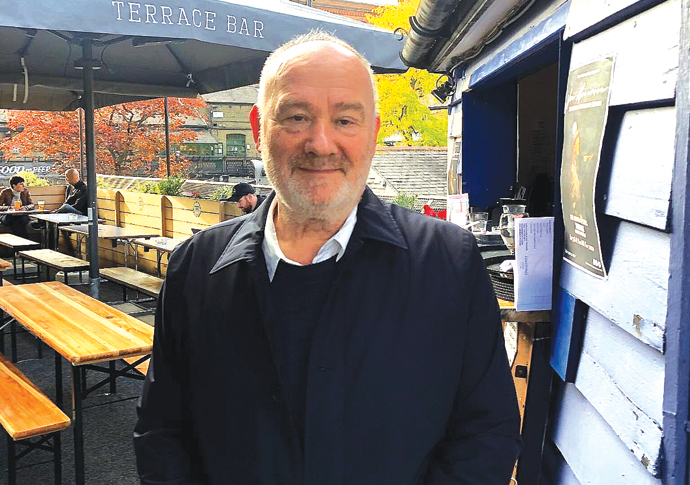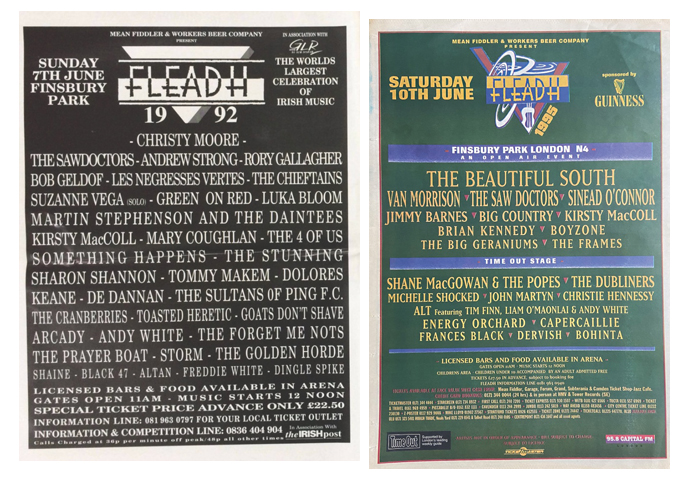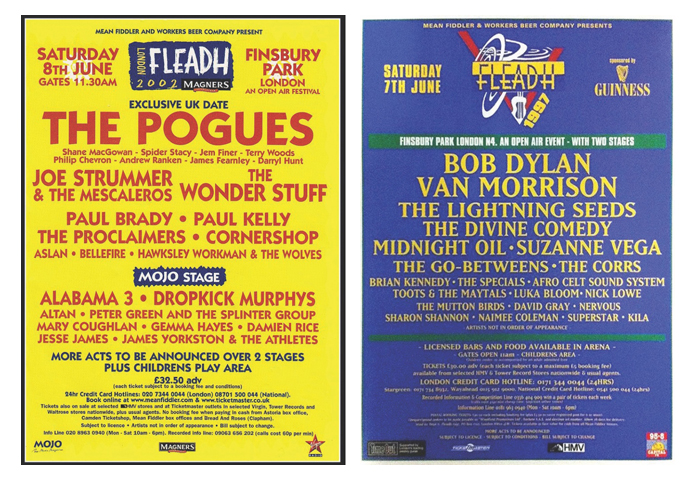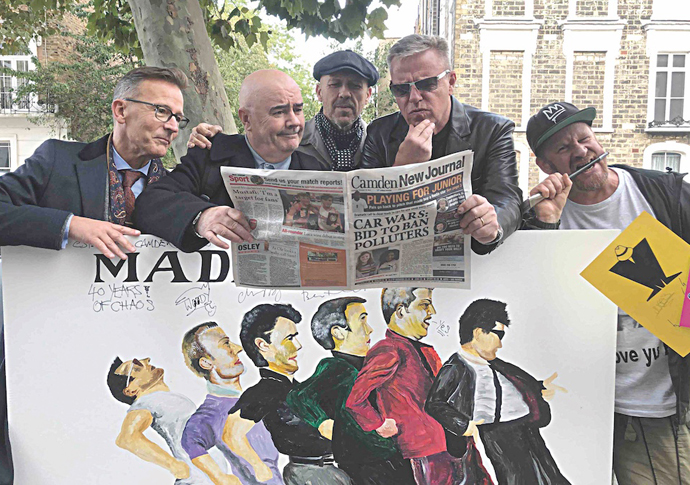The man who triggered an earthquake in Finsbury Park
Tributes pour in for live music champion Vince Power after legendary Fleadh promoter’s death at 76
Friday, 15th March 2024 — By Dan Carrier

Vince Power
TRIBUTES have poured in for the legendary live music promoter Vince Power – whose achievements included filling Finsbury Park with Irish acts– after his death this week aged 76.
The Fleadh founder was being celebrated for revolutionising the festival scene, running some of the capital’s most celebrated venues and booking a roster of the greatest performers of contemporary times, often in surprisingly intimate settings.
He had owned some of London’s most famous stages, from the Jazz Cafe to the Astoria – and, at one time, the Garage in Holloway Road – but he was perhaps best known for his first venue, The Mean Fiddler in Harlesden.
There, he transformed a rundown bar in the early 1980s into a favourite with a gig-goers that Sir Paul McCartney, Johnny Cash and Eric Clapton all performed at.
Later, he showed he could be more expansive and Finsbury Park became a favourite setting. In 1992, he staged the Madness reunion show known as Madstock, a moment which has gone down in musical folklore due to the thunder of 40,000 fans jumping up and down to Suggs and Co causing an earthquake reading to be registered in the area.
That night did not end well for Mr Power after the takings were stolen when his colleague was mugged on the way home.

He had recalled: “She called me up, hysterical. I told her to calm down and we’d sort it. We cancelled all the bankers’ drafts but we never recovered any of the cash. That boy had a good night of it.”
There were many wins and losses and ups and down on Mr Power’s journey, but he never lost his love of Finsbury Park as a venue and promoted gigs by Oasis, Pearl Jam, PJ Harvey, Paul Weller, New Order, Primal Scream, Neil Young and a Sex Pistols reunion gig
But maybe it is The Fleadh which is most fondly remembered by London’s Irish community and beyond. Unbeatable bills of Irish acts would come to the park, while Bob Dylan, The Pogues and Van Morrison were coup headliners.
Mr Power had been born in County Waterford in 1947, he was the son of Jack Power, a forester. There he grew up in a small, isolated cottage in the hamlet of Kilmacthomas and had reflected on his childhood home as having no hot water. He once said if you needed the toilet, you were sent out into surrounding fields.
His mother Brigid had 12 other children and Vince was born in the cottage’s front room.

He was a quiet but confident schoolboy, who laid down a rule that he would try to stick for the rest of his life. “I always thought if you have nothing to say, do not speak rubbish for the sake of hearing your voice,” he once told the Tribune.
He earned a scholarship to go to agricultural college aged 15 to learn the ropes as a bull man – an artificial inseminator for cows, and joked he “didn’t much fancy that, getting cows pregnant for a job”.
So he headed to London in 1963, aged 16, to stay with his Aunt Kitty. Soon after, he met Theresa Fitzgerald, a girl from Cork, at a club in Harlesden. She was his first love, and they married in 1968.
Before his life in music and high-profile gigs which meant rubbing shoulders with the stars, back then Mr Power got work at Woolworths and then as a labourer on construction sites and a spell on a demolition site. He boxed up biscuits on night shifts for McVitie’s at their Park Royal factory, but admitted he ate as many as he packed, and worked on a Heinz beans production line.
Then, after saving his wages, he bought a second-hand van and began a furniture removal business in Holloway.
“I spent £16 on an old police meat wagon. I put adverts in the Yellow Pages saying I’d clear houses. I went to all the estate agents and told them to call me,” he said.
In his personal life, Vince and Theresa split up in the late 1970s and he had a relationship with Patsy Ryce. The couple had two children, Brigid and Patrick. Vince would later have three other children, Nell, Niall and Evie, with partner Alison Charles.
It was in 1981 that Mr Power went on a holiday to the United States which would change his life. He visited Nashville and came home with a plan, confirming a long-held dream of opening a honky tonk music venue.
He began searching for the right premises and headed to Harlesden, an area he chose because he knew Irish publicans who ran the area’s venues.
Mr Power met Van Morrison at the Mean Fiddler in 1983.
The pair became friends and Vince got the singer to make a him vow: he’d perform at the opening night of any venue Vince decided to open.

Vince Power brought Madness, right, to the park for Madstock back in 1992
It was a deal stuck to, right up to his last venture, the reopening of Dingwalls by the canal in Camden Town.
“He used to come to the Mean Fiddler,” Mr Power had recalled.
“Everyone used to come into the Mean Fiddler in the 1980s: The Pogues, Elvis Costello, Christy. We knew them all. I think he knows that I’m a music lover, like him. And he knows that I don’t do it for the money. We just get on.”
Sunday afternoons were reserved for Irish music and 600 people would queue to get in.
Mr Power had always believed that he had to employ people he could trust, and he found bookers who could bring something new and different to his stages.
As he did deals for different venues and became well known, he insisted the music and good times were his motivation.
“Money never made me happy – clearly,” he said.
“My kids make me happy. Achieving stuff makes me happy. Listening to Johnny Cash and Van Morrison records at night makes me happy.”
In 1989, he took on the struggling Reading Festival, added a Leeds version, and transformed the rock-orientated weekender into hugely popular events.
His professionalism and booking policies kicked off the boom in 1990s festivals, spawning many imitators. It meant when the mother of all festivals, Glastonbury, was in real trouble, Mr Power appeared at Worthy Farm like a knight on a white charger.
He saw how fence-jumping and a sense of lawlessness onsite meant Glastonbury was struggling. He tightened security, restructured its tickets and made it the pinnacle for performers.
His success at Glastonbury and across the festival circuit whetted his appetite and he turned his attention to two musical elements that mattered to him.
His Fleadh festivals, meanwhile, were recreated in Glasgow, Chicago, San Jose, Boston, New York, San Francisco and of course in Ireland.
In 2005, Mr Power sold his Mean Fiddler group for £38m to Clear Channel. A CBE for his services to the music industry was another measure of his enduring success.
Irish singer Imelda May told the Tribune: “Vince was a wonderful man and a wonderful supporter of music, especially Irish acts. He kept a lot of music going.
“He gave me one of my breaks early on. He got me a gig at the Mean Fiddler in Dublin and then when I moved to London I got in touch with him and he got me spots at his venues.”
She added: “He gave me a Friday night gig and he got all his friends to come. I thought: ‘If he believes in me, I need to believe in myself.’
“He was a quiet man, a kind man who was always positive. Nothing was ever a big deal. He would always say: ‘Let’s give it a go, why not?’ He always had my back and I am very grateful to him. Vince did it for love.”
Musician Hank Wangford said Mr Power had given country music acts a chance.
“When we first started out, country music was a dirty word. When people asked me what I played, I’d say country out of the side of my mouth. It was still the post-punk era – but the Irish are massive country fans and Vince got it.”
He said Mr Power’s success had ruffled feathers “amongs the big boys” leading to stories being unfairly shared about him. “Despite the stories that he lost money, or didn’t pay people, or was blacklisted by the Musicians’ Union – he was a wonderful, wonderful man,” said the musician, whose real name is Sam Hutt.
“He was constantly being put down by the big guys who thought he was getting too big for his boots. He was always being unfairly denigrated.
“The big boys were threatened by him, and they did not like that, so they tried to force him out of venues, tried to spread rumours.
“But Vince would never give up.”
Vince is survived by his eight children, including Nell who posted a photo of them when she was younger on Instagram which said: “My eternally positive, funny, driven, generous, warm dad.”
